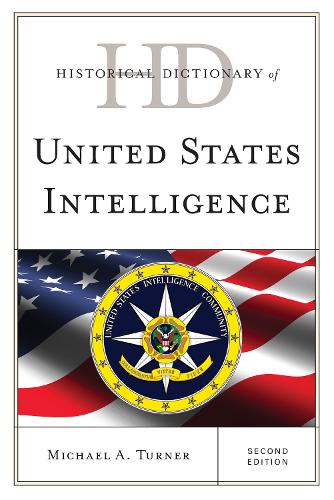
Historical Dictionary of United States Intelligence
(Hardback, Second Edition)
Publishing Details
Historical Dictionary of United States Intelligence
By (Author) Michael A. Turner
Bloomsbury Publishing PLC
Rowman & Littlefield Publishers
8th October 2014
Second Edition
United States
Classifications
General
Non Fiction
327.1273
Physical Properties
Hardback
422
Width 162mm, Height 235mm, Spine 33mm
739g
Description
While the United States has had some kind of intelligence capability throughout its history, its intelligence apparatus is young, dating only to the period immediately after World War II. Yet, in that short a time, it has undergone enormous changesfrom the labor-intensive espionage and covert action establishment of the 1950s to a modern enterprise that relies heavily on electronic data, technology, satellites, airborne collection platforms, and unmanned aerial vehicles, to name a few. This second edition covers the history of United States intelligence, and includes several key features: Chronology Introductory essay Appendixes Bibliography Over 600 cross-referenced entries on key events, issues, people, operations, laws, regulations This book is an excellent access point for members of the intelligence community; students, scholars, and historians; legal experts; and general readers wanting to know more about the history of U.S. intelligence.
Reviews
Turner (political scientist and former Central Intelligence Agency analyst) explores the American intelligence world in this recent addition to the publisher's Historical Dictionaries of Intelligence and Counterintelligence series. While American agents have always engaged in intelligence gathering and counterintelligence work, the enterprise only became systematic following World War II. The volume offers a useful chronology, a list of acronyms and abbreviations, appendixes listing past US intelligence agency leaders, and a detailed, classified bibliography. Everything is covered in this volume, from people (e.g., Gerald Ford, John Brennan) to places, operations, and eventsthe Vietnam War's Operation Phoenix, long-term intelligence operations, the Foreign Intelligence Surveillance Act (FISA) of 1978, unmanned aerial vehicles (UAV), and so forth. Some of the 600-plus entries are just a few sentences, but many are a page or longer, and most are cross-referenced to other entries. This volume belongs in library collections holding similar works, e.g., Nigel West's Historical Dictionary of International Intelligence. Summing Up: Recommended. Lower-level undergraduates through researchers/faculty; general readers. * CHOICE *
Author Bio
Michael A. Turner is a political scientist teaching intelligence and national security matters in San Diego, California. He is a fifteen-year veteran of the Central Intelligence Agency, where he worked in various analytical and staff positions. He also served rotational assignments on Capitol Hill and the Departments of State and Defense. Dr. Turner was twice the recipient of the CIA's prestigious Exceptional Performance Award. He is the author of Why Secret Intelligence Fails and numerous journal articles on intelligence matters, and serves on the editorial board of the International Journal of Intelligence and Counterintelligence.
